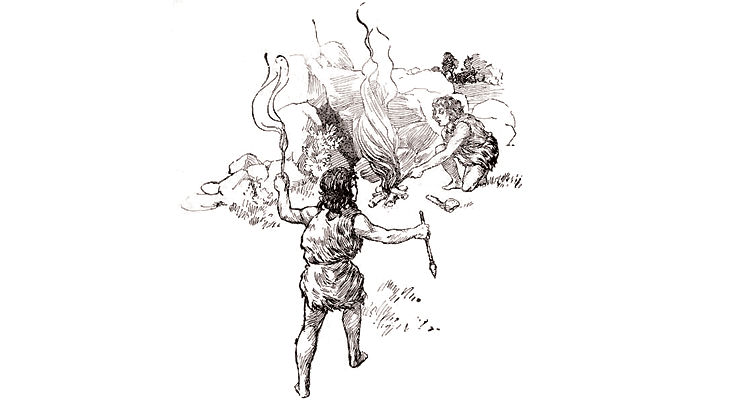The History of Fire

'Illustration by David Danz'
It was the flicker that first caught our primate eyes, tuned as they were to detect motion. But it was the heat that lured us out of the trees. Here was power, safety, and comfort in one dazzling package. Some scholars believe we owe our evolution to it.
For millennia, our ancestors used fire for warmth and light, but when an experimental caveman pierced a chunk of meat with a stick and hung it over the flames—around 790,000 years ago, writes Harvard anthropologist Richard Wrangham in his book, Catching Fire: How Cooking Made Us Human—it set our species on a new path: world domination.
Fire’s energy breaks down carbohydrates and proteins in foods, saving our guts the task, and diverting our energy to brain- and bodybuilding. Scholars connect early evidence of cooking with the rise of Homo erectus, a few evolutionary steps back from Homo sapiens. With the fortifying benefit of cooked food, he became bigger, stronger, and smarter, a precursor to modern humans.
For eons, fire sat at the center of our worldview. The ancient Greeks credited Prometheus for delivering fire to humans, an act of selflessness that elevated people above animals and earned Prometheus the wrath of Zeus.
In pre-Columbian North America, firewood was as important as oil is today; the Narragansett tribe (of what would become Rhode Island) believed Anglo settlers had sailed across the ocean to seize their fuel source, says fire scholar Stephen Pyne of Arizona State University.
Then, life grew easier and longer. Humans began to view fire as less precious and to treat it carelessly. “Early tourists in Yellowstone had a habit of setting a log on fire then leaving,” Pyne says. The act led the park to designate campsites in 1889—the first in the country—in order to reduce the hazard of left-behind logs.
Today, wood fires are a nostalgia kick—even our barbecues are mostly propane bars now. These days, we only see that original flicker—the kind that speaks to something deep inside us—in its full, natural glory and context when we’re sitting outside by a campfire.
So next time you’re hanging out around the fire pit, embrace that primal pull. Understand that you’re sharing a direct connection to our ancestors in a way few people do. And while you’re at it, go ahead and roast up a big chunk of meat—or at least a marshmallow.